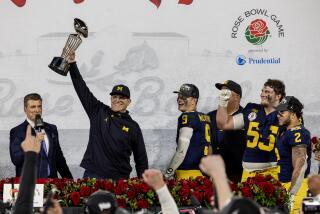Playoff committee releases its top four, with Big 12 left out

Baylor Coach Art Briles responds to questions during a news conference after the College Football Playoff on Dec. 7.
- Share via
The first playoff ranking rendering went over well in 47 of the 48 contiguous states.
The state of Texas may want to secede, but that’s nothing new.
The College Football Playoff committee was a smash hit in Tuscaloosa, Ala.; Eugene, Ore.; Tallahassee, Fla.; and Columbus, Ohio.
Fans of the Pac-12, who suffered through 16 years of an old system that often found last-second ways to keep the conference out, were overjoyed.
Sunday, at about noon, white smoke rose from over the over-the-top Gaylord Hotel in Grapevine, Texas.
We were breathlessly notified, seconds in advance, that an ESPN stagehand was preparing the bracket/ tablet/graphic that would soon be released, along with white doves, to the world.
Soon thereafter the first, four-team playoff was revealed: Alabama, Oregon, Florida State and Ohio State.
That set up two A-list semifinal games: Oregon and Florida State will meet in the Jan. 1 Rose Bowl game, followed immediately by Alabama and Ohio State in the Sugar Bowl.
Baseball would be hard-pressed to stage a better twi-night doubleheader.
Why was the Pac-12 happy?
Oregon was immediately established as a 7.5-point favorite over a Florida State team it could not have played under the old rules.
Based on proxy Bowl Championship Series standings calculated Sunday, Alabama and Florida State would have played for this year’s BCS title, with Oregon coming in a distant third.
As predicted, Saturday night’s closing-bell mayhem came at the heavy expense of the Big 12 Conference, which tried to play two teams against the system and came out with no teams in the playoff.
The Big 12 had a weak poker hand by the time Florida State, Ohio State and Baylor won Saturday night games.
Florida State and Ohio State clinched conference titles with wins, while the Big 12 clenched its teeth.
The results made it easy for the 12-person committee to wash its hands of the fuming Baylor-versus-Texas Christian debate it had, in every way, caused.
The committee made a fundamental mistake last week when, in the course of wanting to demote Florida State to No. 4, artificially inflated TCU to No. 3.
It put TCU three positions ahead of Baylor, which defeated the Horned Frogs in the head-to-head matchup.
The smart tea-leaf reads understood Baylor, if it defeated top-10 Kansas State this weekend, would have to be raised above TCU.
The College Football Playoff protocol manual all but commands the committee to use head-to-head as the deciding tiebreaker.
Baylor, not convinced this was going to happen, hired a public relations firm to plead its case against TCU.
The Big 12 then decided to promote both schools thinking, correctly, there remained a chance both could make the final four.
The Big 12 deemed TCU and Baylor as co-champions, which ran counter to its own motto of “One True Champion.”
The Big 12 promoted that slogan as a buffer to the fact it was the only league that didn’t play a conference title game, but did play a full, round-robin schedule.
It all exploded, Saturday night, right in Big 12 Commissioner Bob Bowlsby’s face.
Baylor Coach Art Briles, in his post-Kansas State victory news conference, chided Bowlsby for his flip-flopping.
“You know if they said we got co-champs, there’s always going to be co-champs, head-to-head doesn’t matter, I’m OK with that,” Briles said. “But don’t say one thing and do another.”
The mess provided the selection committee the perfect way of mitigating whether Baylor or TCU deserved a playoff bid: it left both schools out.
It helped that Florida State won and helped tremendously that No. 5 Ohio State, the sandwich school between TCU and Baylor getting in, made an emphatic statement with its 59-0 victory over No. 13 Wisconsin in the Big Ten title game.
Committee Chairman Jeff Long, in explaining the Big 12 snub, was allowed to use Ohio State to run interference.
“It was really about Ohio State’s movement up,” Long told ESPN studio hosts in his post-verdict comments.
Long said the decision to leave TCU and Baylor out was not done to make things easier for the committee.
He did mention, however, that the Big 12 did not have a clear-cut winner.
“We were faced with co-champions,” Long said. “And that’s what was given to us by the conference.”
Long also did not say, flat out, that the lack of a conference title game hurt the Big 12.
But he did say: “Ohio State’s performance in a 13th game gave them a quality win against a highly ranked team.”
In the end, the committee almost flaunted the Big 12’s dysfunction by advancing “Four True Champions” to the semifinal games.
The committee sent a message that nonconference schedules do matter, and that TCU and Baylor’s schedules did not pass muster when compared with Ohio State’s full body of work.
The committee made tactical mistakes in its first season but, all things considered, got the right four teams.
In a final, parting twist, it did rank Baylor ahead of TCU, in the also-ran positions of No. 5 and No. 6.
It also assembled four other attractive major bowls:
— Orange: Mississippi State vs. Georgia Tech.
— Peach: Mississippi vs. Texas Christian.
— Fiesta: Boise State vs. Arizona
— Cotton: Michigan State vs. Baylor.
The committee will have to absorb a credibility hit for dropping TCU three spots after a 55-3 victory.
It didn’t quite wash that Long explained it by saying the four-team fight for No. 3 last week was very close.
“They were like 3-A, B, C and D,” Long said.
The commissioners who gave us the new system will have to decide in the off-season whether producing a weekly ranking is worth the blowback to a distinguished committee that includes an Air Force general and a former U.S. secretary of state.
“I haven’t determined my point of view on that,” said Pac-12 Commissioner Larry Scott. “My sense is that the first year of a new system it was probably appreciated.”
ESPN might have $5.64 billion reasons, though, over the next 12 years of its current contract, to want to continue weekly broadcasts of this kabuki theater.
The best bet for the off-season is that the Big 12, by next year, will have a title game to guarantee its motto: “One True Champion.”
Long said the committee only “jokingly” considered pairing Baylor with TCU in a bowl that would become the “de facto” Big 12 title game.
Long and committee members had to remember where they were and that, in Texas, on this day, this was no joking matter.
More to Read
Go beyond the scoreboard
Get the latest on L.A.'s teams in the daily Sports Report newsletter.
You may occasionally receive promotional content from the Los Angeles Times.











